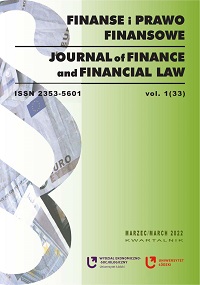Bank deposits of households during Covid-19 in the Visegrad countries
DOI:
https://doi.org/10.18778/2391-6478.1.33.06Keywords:
bank deposits, households, pandemic, Covid-19, Visegrad Group, V4Abstract
The purpose of the article/hypothesis: The main objective of the article is to examine the impact of the Covid-19 pandemic on the value of bank deposits of monetary financial institutions (MFIs) in the V4 countries, i.e. the Czech Republic, Poland, Slovakia and Hungary. The specific objective of this study is to investigate the situation in the market of bank deposits in the Visegrad Group countries during the Covid-19 pandemic. In relation to the adopted goals, the hypothesis was formulated that the Covid-19 pandemic determines the amount of money invested by households from bank deposits in the V4 group, but the determinants of this saving and the direction and strength of their impact are varied.
Methodology: The achievement of the set objectives was based on theoretical studies and empirical research. In the theoretical studies a critical analysis of source literature was applied. Empirical research involved time series analysis and multiple linear regression analysis.
Results of the research: The results of the study allowed for positive verification of the hypothesis, and the study objectives were achieved. It has been shown that changes in the number of Covid-19 cases, as well as changes in the number of deaths and the number of vaccinations performed for Covid-19 in individual V4 countries translate into the propensity or aversion to deposit money in bank financial institutions. This is confirmed primarily by regression analysis, but also by time series analysis.
Downloads
References
Amory, M., Markhvida, M., Hallegatte, S. i Walsh, B. (2020). Socio-Economic Impacts of COVID-19 on Household Consumption and Poverty. Economics of Disasters and Climate Change, 4 https://doi.org/10.1007/s41885-020-00070-3
Google Scholar
DOI: https://doi.org/10.1007/s41885-020-00070-3
Beckmann, E., Hake, M. i Urvova J. (2013). Determinants of households‘ savings in Central, Eastern and Southeastern EURpe. Focus on EURpean Economic Integration, 3(8) http://www.oenb.at/de/img/feei_2013_q3_studies_beckmann_tcm14-257382.pdf [dostęp 10.12.2021].
Google Scholar
Bywalec, C. (2012). Ekonomika i finanse gospodarstw domowych. Warszawa: PWN.
Google Scholar
Cichowicz, E. i Nowak, A. (2016). Wybrane determinanty rozwoju rynku długoterminowego oszczędzania w Polsce. W: J. Rutecka-Góra, red., Długoterminowe oszczędzanie. Postawy, strategie, wyzwania. Warszawa: Oficyna Wydawnicza SGH w Warszawie.
Google Scholar
Crossley, T., Emmerson, C. i Leicester, C. (2012). Raising Household Saving. London: Institute for Fiscal Studies, British Academy.
Google Scholar
Damps-Lewińska, E. (2017). Lokaty bankowe jako narzędzie gromadzenia oszczędności na emeryturę. Zeszyty Naukowe Politechniki Poznańskiej: Organizacja i Zarządzanie, 73 https://doi.org/10.21008/j.0239-9415.2017.073.03
Google Scholar
DOI: https://doi.org/10.21008/j.0239-9415.2017.073.03
Dossche, M. i Zlatanos, S. (2020). COVID-19 and the increase in household savings: Precautionary or forced? ECB “Economic Bulletin”, 6.
Google Scholar
Frączek, B. (2012). Analiza czynników wpływających na oszczędzanie i inwestowanie gospodarstw domowych. Studia Ekonomiczne Uniwersytetu Ekonomicznego w Katowicach, 122.
Google Scholar
Dang, Hai-Anh H. i Nguyen, C.V. (2021). Gender inequality during the COVID-19 pandemic: Income, expenditure, savings, and job loss. World Development, 140 https://doi.org/10.1016/j.worlddev.2020.105296
Google Scholar
DOI: https://doi.org/10.1016/j.worlddev.2020.105296
Harasim, J. (2007). Teoretyczne aspekty gromadzenia i inwestowania nadwyżek finansowych przez gospodarstwa domowe. W: J. Harasim, red., Oszczędzanie i inwestowanie indywidualne w Polsce, Katowice: PTE.
Google Scholar
Intrum (2020). EURpean Consumer Payment Report 2020. November.
Google Scholar
Kłopocka, A. (2018). Skłonność gospodarstw domowych do oszczędzania a wiedza finansowa. Bank i Kredyt, 49(5).
Google Scholar
Kochaniak, K. (2015). Stabilność depozytów gospodarstw domowych w zmiennych uwarunkowaniach rynku finansowego i gospodarek państw strefy EUR – regulacje a rzeczywistość. Bank i Kredyt, nr 46(5).
Google Scholar
Krupa, D., Walczak, D. i Chojnacka, E. (2012). Preferencje w zakresie form alokacji oszczędności gospodarstw domowychw Polsce. Copernican Journal of Finance & Accounting, 1 https://doi.org/10.12775/CJFA.2012.008
Google Scholar
DOI: https://doi.org/10.12775/CJFA.2012.008
Lydon, R. i McIndoe-Calder, T. (2021). Saving during the pandemic: Waiting out the storm?. Central Bank of Ireland, Economic Letter, 4 https://www.centralbank.ie/docs/default-source/publications/economic-letters/vol-2021-no-4-saving-during-the-pandemic-waiting-out-the-storm-reamonn-lydon-and-tara-mcindoe-calder.pdf?sfvrsn=7[dostęp 25.12.2021].
Google Scholar
Musiał, M. (2014). Zachowania oszczędnościowe Polaków na tle wybranych krajów Unii EURpejskiej. Marketing i Rynek, 8.
Google Scholar
Olejnik, I. i Białowąs, S. (2016). Płeć a preferencje gospodarstw domowych w zakresie sposobów zabezpieczenia na okres starości. W: J. Rutecka-Góra, red., Długoterminowe oszczędzanie. Postawy, strategie, wyzwania. Warszawa: Oficyna Wydawnicza SGH w Warszawie.
Google Scholar
Ostrowska-Dankiewicz, A. (2016). Ubezpieczenia na życie w strukturze oszczędności gospodarstw domowych. AnnalesUniversitatis Marie Curie-Skłodowska Lublin – Polonia, L4, SectioH https://doi.org/10.17951/h.2016.50.4.363
Google Scholar
DOI: https://doi.org/10.17951/h.2016.50.4.363
Świetlik K. (2009). Motywy i determinanty oszczędności gospodarstw domowych na przykładzie gospodarki polskiej. Pieniądze i Więź, 2(43).
Google Scholar
Webley, P. i Nyhus E. (2008). Inter-temporal choice and self-control; saving and borrowing. W: A. Lewis, ed., The Cambridge handbook of psychology and economic behaviour. Cambridge: Cambridge University Press.
Google Scholar
DOI: https://doi.org/10.1017/CBO9780511490118.005
Wierzbicka, E. (2018). Determinanty zwiększenia w Polsce oszczędności gospodarstw domowych. Zeszyty Naukowe WSH: Zarządzanie, 4 https://doi.org/10.5604/01.3001.0013.1642
Google Scholar
DOI: https://doi.org/10.5604/01.3001.0013.1642
Zaleśkiewicz, T. (2012). Psychologia ekonomiczna. Warszawa: PWN.
Google Scholar
(www1) https://sdw.ecb.EURpa.eu/browseTable.do?org.apache.struts.taglib.html.TO-KEN=8c7b32ee2876531c0b5b401375fe2de1&df=true&ec=&dc=&oc=&pb=&rc=&DATA-SET=0&removeItem=&removedItemList=&mergeFilter=&active-Tab=BSI&showHide=&FREQ.14=M&REF_AREA.14=CZ&REF_AREA.14=HU&REF_AREA.14=PL&REF_AREA.14=SK&DATA_TYPE.14=1&COUNT_AREA.14=U2&CO-UNT_AREA.14=U6&BS_COUNT_SECTOR.14=1000&MAX_DOWNLOAD_SERIES=500&SERIES_MAX_NUM=50&node=9691312&legendPub=published [dostęp 15.10.2021].
Google Scholar
(www2) https://ourworldindata.org/ [dostęp 15.10.2021].
Google Scholar
Downloads
Published
How to Cite
Issue
Section
License

This work is licensed under a Creative Commons Attribution-NonCommercial-NoDerivatives 4.0 International License.














